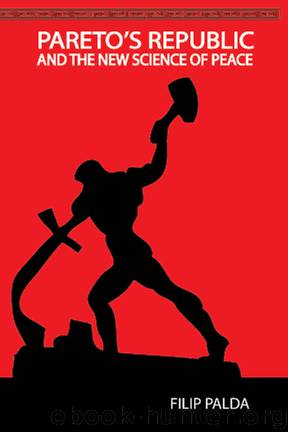Pareto's Republic and the New Science of Peace by Filip Palda

Author:Filip Palda [Palda, Filip]
Language: eng
Format: epub
Tags: economics, political economy, nonfiction, retail
ISBN: 9780987788009
Publisher: Cooper Wolfling
Published: 2012-02-08T00:00:00+00:00
So what about fairness?
I have not mentioned fairness so far in this chapter, which may seem a major omission as most people believe that government should have some role in determining a fair division of resources. Instead, I have argued that government’s only role in society is to plug gaps left when private property rights malfunction, and that even then, government should divest itself of managing these resources once privatization becomes feasible. To understand the role of fairness in Pareto’s Republic, we need to distinguish between the concept’s two variants.
The first variant is distributional fairness. It is a criterion for dividing society’s resources separately from any decisions individuals might make. As explained in the previous chapter, distributional fairness was the major preoccupation of former East Bloc countries when they made the transition from socialism to the free market. To make the transition, governments had to transfer the bulk of their holdings into private hands. Pareto efficiency was useless as a guide because there were too many Pareto-efficient initial distributions to choose from. Countries in transition had to rely on societal notions of fairness in the transfer and they had to make sure that no individual could influence his or her own particular slice of the pie, a condition that was honoured more in the breach than in the observance.
Once they had transferred resources into private hands, these countries had to implement the second form of fairness, procedural fairness. This is a criterion for managing resources once the initial distribution is done and it can depend heavily on individual choice. The two main forms of procedural fairness available in large societies are management of resources by government officials and management by people holding private property. Having emerged from state management, transition economies naturally strove to create economies based on private property, trusting in the second theorem of welfare economics which holds that the “lump-sum” transfers they made to their people would lead to one specific Pareto-efficient outcome for society. This is an arid but correct way of saying that once you put private property into people’s hands and allow them to trade freely in a market, these people will seek out and find how best to exchange their initial endowments in a Pareto-efficient manner.
The distinction between distributive and procedural fairness needs to be refined to account for the fact that chance frequently undoes any initial fair distribution governments make. The “slings and arrows of outrageous fortune” and the “heartaches and thousand natural shocks that flesh is heir to,” as Shakespeare put it, are relentlessly challenging the accomplishments of static fairness. A man’s house may burn to the ground. A woman may win the lottery. Some are born with great intellectual gifts, or a passion for life, while others cannot chase off the black dog of depression. Private insurance can protect us from some disasters, but there is no policy than can shield us from all the bad knocks we may take through life, especially not in the presence of something called moral hazard.
Download
This site does not store any files on its server. We only index and link to content provided by other sites. Please contact the content providers to delete copyright contents if any and email us, we'll remove relevant links or contents immediately.
International Integration of the Brazilian Economy by Elias C. Grivoyannis(57316)
The Radium Girls by Kate Moore(10906)
Turbulence by E. J. Noyes(7037)
Nudge - Improving Decisions about Health, Wealth, and Happiness by Thaler Sunstein(6633)
The Black Swan by Nassim Nicholas Taleb(6190)
Pioneering Portfolio Management by David F. Swensen(5605)
Rich Dad Poor Dad by Robert T. Kiyosaki(5147)
Zero to One by Peter Thiel(4823)
Man-made Catastrophes and Risk Information Concealment by Dmitry Chernov & Didier Sornette(4735)
Secrecy World by Jake Bernstein(3782)
Millionaire: The Philanderer, Gambler, and Duelist Who Invented Modern Finance by Janet Gleeson(3568)
Skin in the Game by Nassim Nicholas Taleb(3459)
The Age of Surveillance Capitalism by Shoshana Zuboff(3421)
The Money Culture by Michael Lewis(3284)
Skin in the Game: Hidden Asymmetries in Daily Life by Nassim Nicholas Taleb(3264)
Bullshit Jobs by David Graeber(3179)
The Dhandho Investor by Mohnish Pabrai(3167)
The Wisdom of Finance by Mihir Desai(3077)
Blockchain Basics by Daniel Drescher(2889)
